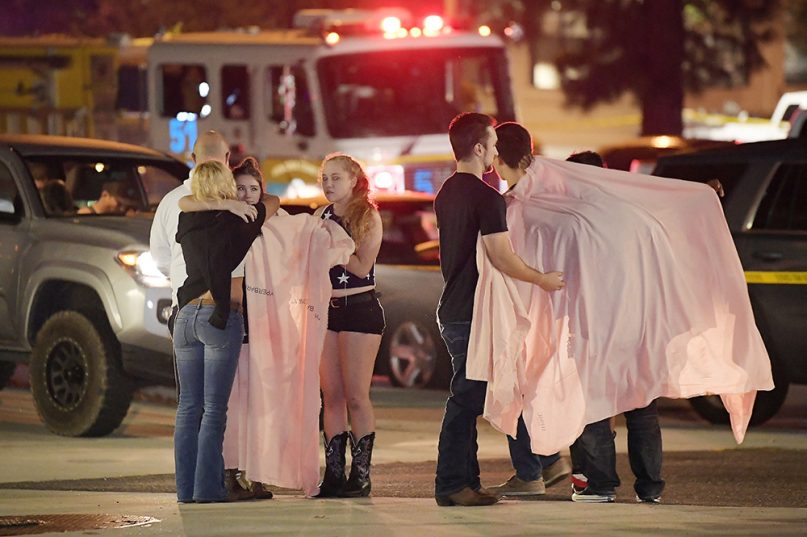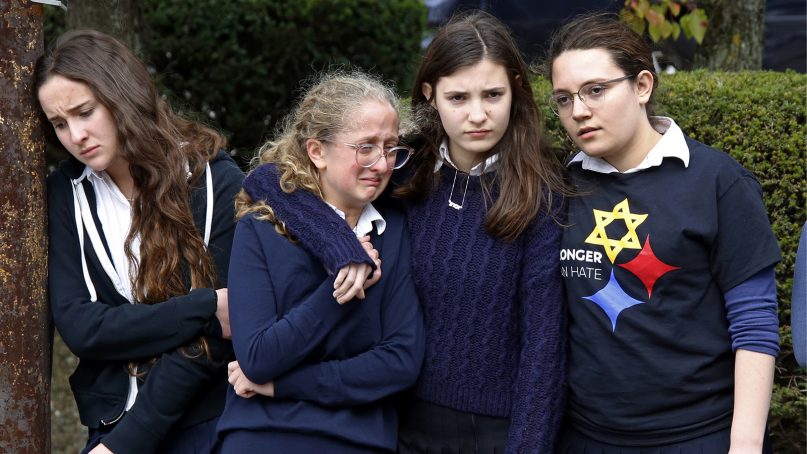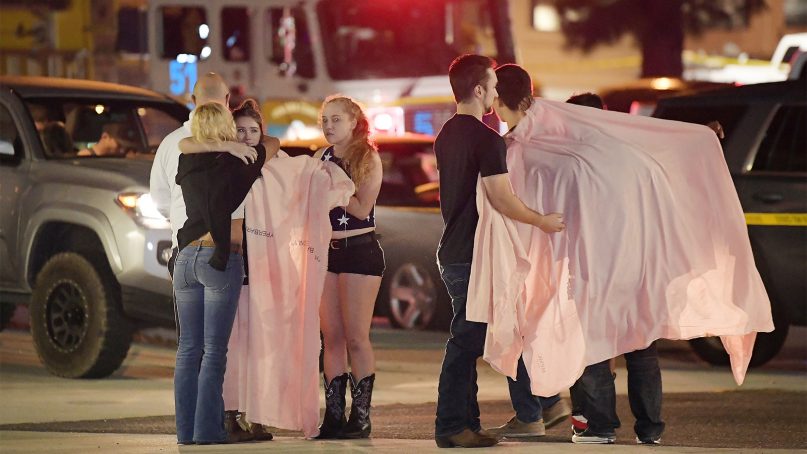
People comfort each other as they stand near the shooting scene in Thousand Oaks, Calif., on Nov. 8, 2018. A gunman opened fire inside a country dance bar crowded with hundreds of people on “college night.” (AP Photo/Mark J. Terrill)
(RNS) — After a steady drumbeat of bomb threats, the horrific attack on a Pittsburgh synagogue and now, in California, yet another shooting seemingly targeting young people, Americans may be starting to feel as if our country is drowning in grief and collectively can’t come up for air.
The pain we see in Pittsburgh and Thousand Oaks impacts all of us in the towns in between. It leaves us asking in despair: “What can we do?”
As a pediatric oncologist and hospice and palliative care doctor at St. Jude Children’s Research Hospital in Memphis, Tennessee, I have the honor of working closely with children suffering from the worst diseases imaginable. Walking this journey with a child with cancer and his or her family has taught me that even in the face of pain, we must be willing to be vulnerable precisely when our fear tells us to run away.
Most of us have an idea of what compassion means; for me the true meaning of compassion lies in its Latin roots, “to suffer with.” I suffer with my patients and their parents during their time of greatest need. I walk with them from devastating diagnosis through many crises and on to wellness, or to death.
My team and I join our patients and their families on a very personal, exquisitely painful journey. Along the way, these remarkable people have taught us how to “suffer with” people, how to show compassion, and how we can show up.
Kevin and Christine O’Brien, two bereaved parents from St. Jude, had a daughter who was diagnosed with a brain tumor about 10 years ago. Catie was a remarkable young lady with a huge heart and a smile that lit up a room. As Catie was dying, she gave her family an edict: “I don’t want other children to have to suffer from this. I want to make sure that this does not happen to other kids. So, Mom and Dad, do everything you can possibly do to help them and their families.”
I was able to help the O’Briens and other amazing bereaved parents to create a steering council of bereaved parents who help train St. Jude’s clinical staff to deliver difficult news and better support patients and families. Additionally, these bereaved parents choose to address their grief head-on by working with other parents who are newly bereaved.

Students from the Yeshiva School in the Squirrel Hill neighborhood of Pittsburgh pay their respects as the funeral procession for Dr. Jerry Rabinowitz passes their school en route to Homewood Cemetery after a funeral service at the Jewish Community Center on Oct. 30, 2018. Rabinowitz was one of 11 people killed while worshipping at the Tree of Life synagogue on Oct. 27, 2018. (AP Photo/Gene J. Puskar)
You may think a parent whose child has died wouldn’t want to relive that tragedy. But many of our parents find that sharing the lessons of their own experiences offers an opportunity to carry on their child’s legacy. Grieving parents say that friends, family and neighbors often pull away after a tragedy, wrongly assuming that those who have a lost a child don’t want to talk about their pain.
To the contrary, these parents show us how to lean into the grief. They ask us to open our hearts to do our very best to carry some of that person’s suffering with us. It truly is as simple as that. And as you can imagine, it’s as hard as it sounds.
As a society, we have become avoiders of moments of pain. I believe we need to become embracers instead. What grieving people desperately want and need is for someone to really listen.
I encourage people not to avoid grieving friends, family, neighbors and co-workers. Don’t make excuses like, “I don’t want to make things worse” or “I don’t want to bring up a painful subject.” Instead, share the burden with them and give the gift of your time and heart.
You may not deal with grieving parents every day like I do, but we all encounter people who are grieving. The next time you see someone hurting, be fully present and be willing to be vulnerable. Practice compassion by trying to take some of that person’s suffering on yourself.
Know that, in doing this, you’re living for others and giving that person, and yourself, one of life’s greatest gifts.
We are the ones grieving people all around us are counting on. It’s you. It’s me. It’s up to us.
(Justin Baker is a pediatric oncologist and palliative care specialist at St. Jude Children’s Research Hospital. The views expressed in this commentary do not necessarily represent those of Religion News Service.)





